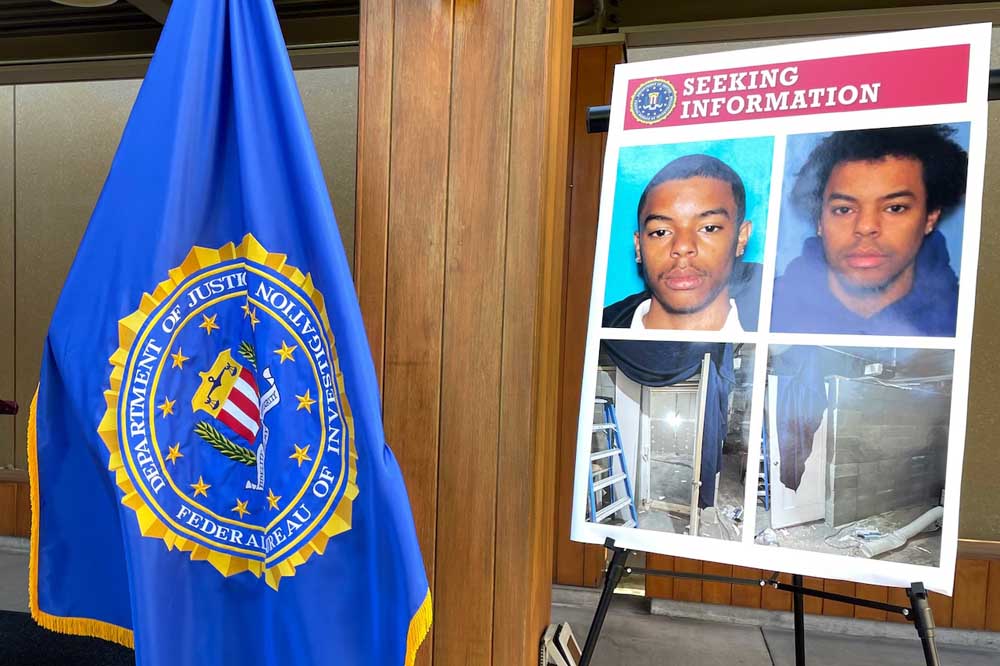UPDATE: Zuberi found guilty of double-kidnapping, locking one woman in cinder-block cell
Published 10:15 am Saturday, October 19, 2024

- The FBI displayed photos of Negasi Zuberi after his arrest in the kidnapping of a Seattle woman, who was brought to his Klamath Falls home.
A federal jury Friday quickly returned guilty verdicts on all counts against Negasi Zuberi, finding he had kidnapped two 21-year-old women within two months last year, sexually assaulted them and held them against their will for hours in the garage of his rental home in Klamath Falls.
Trending
“He violated their bodies. He violated their freedom and he violated the law. Hold him accountable,” Assistant U.S. Attorney Jeffrey S. Sweet told jurors in closing arguments.
The jury issued the verdicts after less than four hours of deliberations on the eighth day of the trial before U.S. District Judge Michael J. McShane in Medford.
Zuberi’s lawyers called no witnesses, but they played a cellphone video that Zuberi made of one of the victims in the back of his Honda Pilot SUV on May 6, 2023. They argued that the footage showed Zuberi and the Klamath Falls woman had consensual sex.
Trending
The woman testified earlier this week that Zuberi filmed what he called an “insurance” video, demanding that she lie on top of him and pretend she was having a good time.
Zuberi created the video to “silence” or blackmail the woman, threatening to play it for others if she reported his assault, prosecutors argued.
“He made her fears come true” by playing it for the jury of 12 but she bravely took the stand regardless, Assistant U.S. Attorney Nathan J. Lichvarcik said.
“He’s preying on people he thinks are weak, preying on people he thinks are vulnerable, and he misjudged big time,” Lichvarcik said.
Zuberi chose not to take the stand in his own defense on Thursday but changed his mind Friday after he heard Lichvarcik’s closing. The judge denied Zuberi’s request.
“He’s changed his mind too late,” McShane said. “I think this is, in fact, a ploy to disrupt the case in some appellate manner.”
Zuberi, now 30, was convicted of one count each of kidnapping and transportation for criminal sexual activity for the July 14, 2023, abduction of a Washington woman from Seattle, one count of kidnapping in the May 2023 abduction of the Klamath Falls woman from a local bar, two counts of possession of a firearm and ammunition and two counts of possession of ammunition.
The testimony from each of his victims alone would have been enough to convict Zuberi, Lichvarcik told the jury. But he noted that FBI agents and police also uncovered Zuberi’s plans.
Those included a handwritten note found in Zuberi’s bedroom titled “Operation Take Over,” a so-called “target” list of women in their 20s and jottings on how Zuberi desired to “raise an army,” the prosecutor said.
Federal agents also found the makeshift cinder block cell in the garage of Zuberi’s home where he imprisoned the Washington woman as well as the handcuffs, leg irons, cellphone jammers, Taser and gun he used on the women or threatened them with, Lichvarcik said.
Zuberi ran off with his family once the Washington woman escaped from the locked cell and then acknowledged to police, “I’m f——” after he was cornered by police in a Walmart parking lot and arrested in Reno.
“He left a dump truck of evidence behind him,” Lichvarcik said.
Zuberi was earlier convicted in California of assault in 2021 for soliciting sex from a 16-year-old girl and then beating her in a remote area of Alameda County.
Attorney Michael P. Bertholf, one of Zuberi’s defense lawyers, said the women’s accounts in this case weren’t reliable and didn’t match all the evidence. He urged jurors to question why prosecutors presented so much testimony that wasn’t directly related to the charges.
“This case is a case of government overreach,” he said.
Both women testified, describing harrowing accounts of their hours-long abductions.
The Washington woman, a commercial sex worker, said she willingly entered Zuberi’s car when he picked her up along Seattle’s Aurora Avenue, an area known for prostitution. But after he drove her to a nearby alley, had sex with her and paid her $100, Zuberi suddenly pointed a Taser at her, cuffed her wrists and bound her ankles with leg irons.
He purported to be an undercover officer who had gone too far and told her he was taking her to a transition center for processing before jail, but then drove her 450 miles to southern Oregon, stopping in a remote spot off the freeway and repeatedly sexually assaulting her, she said.
After arriving in Klamath Falls, Zuberi locked her in the garage cell, she said. After falling asleep for an hour or so, she awoke, panicked and started yelling for help. She bit off her long acrylic nails and then pounded with her fists on the cell door until she knocked the mesh off and squeezed through a small rectangular slat, and then busted the hinges off another wooden door.
She escaped barefoot through a small door in the garage, jumped a wooden fence and flagged down a motorist, who called 911 just after noon on July 15, 2023.
Tracking Zuberi’s cellphone GPS pings, Reno police and FBI agents found Zuberi’s Honda Pilot at the Reno Walmart the next day.
Reno police hostage negotiator Timothy Broadway testified that he talked with Zuberi on Facetime video, trying to coax him out of the driver’s seat. Broadway said Zuberi had pulled a knife and was cutting his lower leg and bleeding and bemoaning that he couldn’t kill himself.
Zuberi ultimately stepped out, holding his young son, and smashed his phone on the asphalt before he was taken into custody, Broadway said.
Zuberi had fled with his two young children and their mother, Alycia Westfall. They lived with him in the Klamath Falls home that he rented from the city’s mayor, who also took the stand.
A search of the Honda Pilot turned up a knife on the driver’s floorboard, handcuff keys, a 9 mm shell casing under a second row seat, a 9 mm bullet in the center console, a Dollar Tree receipt for cleaner with bleach and paper towels and a black backpack that contained Zuberi’s passport.
A search of Zuberi’s iCloud account revealed he had searched for flights from Reno to New York and Reno to Turkey, according to court testimony.
After his arrest, FBI agents learned of a Klamath Falls woman who had reported her abduction and sexual assault to local police two months earlier.
The woman testified at Zuberi’s trial that she left an Irish bar called The Pikey early on May 6, 2023, and was approached by a man who told her that his name was Sakima. Investigators said that was one of Zuberi’s aliases.
She said she felt woozy and didn’t recall how she got into his car. Zuberi drove her out of the city to a rural area, stopped on the side of the road, shot the Taser into her ribs, handcuffed her, drove her back to his home and repeatedly raped her in the back seat of the Honda Pilot parked in the garage, she said.
It wasn’t until she made up a story about having to give medication to her sick dog that Zuberi ultimately let her go after 13 hours.
While the Klamath Falls victim was still in his car, Zuberi received a text message around 11:44 a.m. from the mayor’s son asking if he could pick up rent that day around 1 p.m. Zuberi responded, according to a court exhibit: “Oh sorry, I slept late today. Can we do 4 p.m.?”
About 1:30 p.m., Zuberi drove the woman to a Chase Bank branch in town, withdrew cash and gave her $300, then dropped her off near her home.
Ashamed by what had occurred, she said she made up a story that an old friend on drugs had beaten her up and didn’t divulge the rape when she went to a hospital that afternoon and returned to the hospital the next day.
But three days after her abduction, she said she reported the sexual assault to Klamath Falls police. The officer who interviewed her, however, didn’t take the unwashed clothes she had worn during the attack or a sketch she made of her kidnapper, she said.
The officer also never called her back. The woman said she had to call police three or four more times before another officer told her the department would alert her if there were any developments in her case. She heard nothing until after Zuberi was arrested, she said.
Bertholf, the defense lawyer, argued that the Klamath Falls woman never got tested for sexually transmitted diseases. “Her story doesn’t make sense,” he argued.
Lichvarcik, the prosecutor, urged jurors not to discount the Klamath Falls woman’s testimony because she had at first made up an account of what occurred.
He asked them to consider how she broke down in tears upon learning from the FBI of Zuberi’s arrest, which was caught on video and played in court.
“That’s what extreme threats, humiliation, fear does to a person,” he said. “There’s not many more ways that a man can break a woman down, physically, psychologically, emotionally, than what he did to her.”
The judge set Zuberi’s sentencing for Jan. 16.
After the verdicts were announced, the judge also lifted a prior prohibition he had issued that had prevented Zuberi from calling and speaking with Westfall, the mother of his two sons.
Zuberi still faces a pending charge of attempted escape from the Jackson County Jail. He’s accused of using an improvised, screw-like device to strike and shatter glass in his cell on Aug. 22, according to a probable cause affidavit. He then covered the shattered glass with books and paper in an apparent attempt to hide it, the affidavit said. The device was found attached to his sandal, the affidavit said.
Earlier coverage from Friday:
After a prosecutor completed his closing argument at the end of Negasi Zuberi’s federal trial on kidnapping charges, Zuberi’s defense lawyer stood to inform the judge that Zuberi now wished to testify.
Defense attorney Amy E. Potter argued Friday that case law allowed the judge to grant the request, even so late in the case and after both sides had rested. She cited a four-factor test to consider, including the character of the proposed testimony.
So U.S. District Judge Michael J. McShane asked Zuberi what he wanted to say on the witness stand.
Zuberi, 30, said he would testify about the two alleged victims “and what happened. My version of the story, who I am as a person and things like that.”
He has pleaded not guilty to two counts of kidnapping, one count of transportation for criminal sexual activity, two counts of being a felon in possession of guns and ammunition and two counts of being a felon with ammunition.
Zuberi is accused of abducting a 21-year-old woman from Seattle late on July 14, 2023, sexually assaulting her as he drove her 450 miles to his Klamath Falls rental home and locking her in a cinder block cell in the garage early the next morning. She testified that she punched out the mesh on a locked door of the cell, squeezed through an opening, escaped out the garage and flagged down a motorist for help.
Zuberi is also accused of kidnapping and sexually assaulting another 21-year-old woman two months earlier after meeting her outside a Klamath Falls bar and holding her against her will for up to 13 hours in his car in his garage.
Zuberi said he initially decided against testifying a day before, on Thursday, because his lawyers “persuaded me not to.”
“I would like to testify if you would please, allow me to,” he told McShane.
The government did not take a position on Zuberi’s request.
McShane took a five-minute break and then announced that he wouldn’t let Zuberi take the stand this late in the trial.
McShane had advised Zuberi on Thursday that he had a right to testify. At that time, Zuberi clearly said he didn’t wish to take the stand, the judge noted Friday.
“Mr. Zuberi has now changed his mind, but he’s changed his mind too late,” McShane said. “I think this is, in fact, a ploy to disrupt the case in some appellate manner.”
McShane said he has granted previous requests from Zuberi — for a change in lawyers and to be moved to the federal prison in Sheridan and then back to Jackson County Jail. As for testifying, Zuberi could have contacted the court about changing his mind on Thursday afternoon after the jury was sent home early or Friday before jury instructions and closing arguments began, McShane said.
Instead, Zuberi chose to listen to the government’s closing arguments and then announced he wanted to testify, McShane said.
The testimony would have a “disruptive effect” on the case, McShane ruled, requiring prosecutors to potentially call back witnesses to rebut Zuberi’s statements and issue a second closing argument.
“That’s just not the way we conduct trials,” McShane said. “There’s a reason why we have careful colloquies to make sure the waiver is being made intelligently, knowingly and voluntarily. I realize he’s had a change of heart. That decision has come too late.”
The four factors a judge must weigh — timeliness, disruptive effect, reasonableness and character of the proposed testimony — all weigh against allowing Zuberi to take the stand, McShane ruled.









